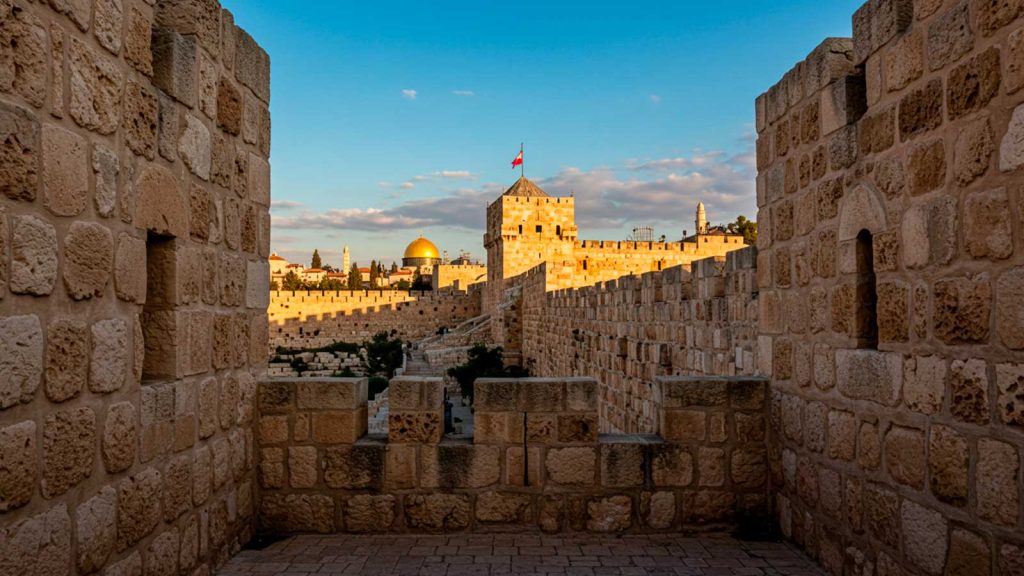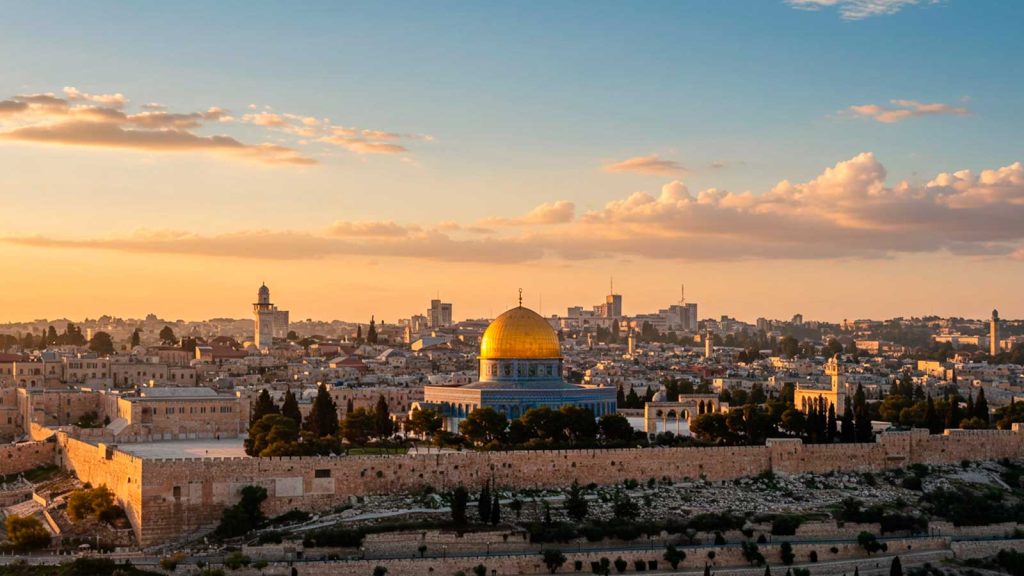Psalm 48 is a powerful song of praise that exalts the majesty of God and His unshakable presence in Zion. This biblical psalm celebrates the beauty of the city of God, its strength as a safe refuge, and its central role in the history of the people of Israel.
Throughout this article we will explore the meaning, spiritual message, and lasting importance of Psalm 48, connecting it to themes such as trust, worship, and divine protection.
Psalm 48 Complete
¹ Great is the Lord and greatly to be praised in the city of our God, in His holy mountain.
² Beautiful in elevation, the joy of the whole earth, is Mount Zion on the far north, the city of the great King.
³ God is known in her palaces as a high refuge.
⁴ For behold, the kings assembled; they passed by together.
⁵ They saw it, and so they marveled; they were troubled and hastened away.
⁶ Trembling took hold of them there, pain like that of a woman in labor.
⁷ You break the ships of Tarshish with an east wind.
⁸ As we have heard, so we have seen in the city of the Lord of Hosts, in the city of our God; God will establish her forever. (Selah.)
⁹ We remember Your lovingkindness, O God, in the midst of Your temple.
¹⁰ According to Your name, O God, so is Your praise to the ends of the earth; Your right hand is full of righteousness.
¹¹ Let Mount Zion rejoice; let the daughters of Judah be glad because of Your judgments.
¹² Walk about Zion, go all around her, count her towers.
¹³ Mark well her ramparts, consider her palaces, that you may tell it to the next generation.
¹⁴ For this God is our God forever and ever; He will be our guide even to death.

Psalm 48 Study – Verse-by-Verse Explanation
Psalm 48:1
Great is the Lord and greatly to be praised in the city of our God, His holy mountain.
This verse opens the psalm by exalting the greatness of God and His worthiness to be praised. The “city of our God” is Jerusalem, and the “holy mountain” is Mount Zion, a symbolic place of divine presence.
Psalm 48:2
Beautiful in elevation, the joy of the whole earth, is Mount Zion on the far north, the city of the great King.
Zion is described as beautiful and enchanting, bringing joy to the whole earth. It is called “the city of the great King,” highlighting God’s sovereign rule there.
Psalm 48:3
God is known in her palaces as a high refuge.
The palaces of the city are protected by God, who manifests Himself as a secure refuge. He is known as the one who protects and sustains His people amid adversity.
Psalm 48:4
For behold, the kings assembled; they passed by together.
The psalmist speaks of a military threat: kings unite to attack Jerusalem, but their plan fails before the presence of God.
Psalm 48:5
They saw it, and so they marveled; they were troubled and hastened away.
When confronted with the greatness of the city protected by God, the enemies are astonished and flee in fear, unable to face it.
Psalm 48:6
Trembling took hold of them there, pain like that of a woman in labor.
The anguish of the enemies is intense, likened to a woman’s labor pains—an image of sudden, uncontrollable suffering.
Psalm 48:7
You break the ships of Tarshish with an east wind.
God is compared to a force of nature that destroys mighty ships. The “ships of Tarshish” represent grand commercial and naval powers that cannot withstand Him.
Psalm 48:8
As we have heard, so we have seen in the city of the Lord of Hosts, in the city of our God. God will establish her forever. (Selah.)
The people acknowledge that everything they heard about God’s deeds has been confirmed by experience. Jerusalem is eternally sustained by the Lord of Hosts.
Psalm 48:9
We remember Your lovingkindness, O God, in the midst of Your temple.
In the temple, the people meditate on God’s goodness. Remembering His lovingkindness is an act of worship that strengthens the community’s faith.
Psalm 48:10
According to Your name, O God, so is Your praise to the ends of the earth; Your right hand is full of righteousness.
The name of God is universally recognized, and with it comes His praise. The “right hand” symbolizes His power to act justly, ensuring righteousness in His decisions.
Psalm 48:11
Let Mount Zion rejoice; let the daughters of Judah be glad because of Your judgments.
There is joy and exultation in the land of Judah because of God’s judgments, which are just and liberating. The “daughters” represent the cities and inhabitants of Judah.
Psalm 48:12
Walk about Zion, go all around her, count her towers.
The psalmist invites the people to carefully observe the details of the holy city—its towers and walls—as a testimony to God’s faithfulness.
Psalm 48:13
Mark well her ramparts, consider her palaces, that you may tell it to the next generation.
This verse emphasizes the duty to preserve and transmit the history of divine protection to future generations, inspiring faith and confidence.
Psalm 48:14
For this God is our God forever and ever; He will be our guide even to death.
The psalm ends with a powerful statement: God is eternal and faithful. He not only reigns in Zion but guides each individual throughout life, even to the end.

The Central Message of Psalm 48
Psalm 48 highlights the city of God—Jerusalem—as the symbol of divine security. More than a physical place, Zion represents God’s faithfulness to His people and His sovereignty over all nations. The psalm invites believers to contemplate God’s glory, reflected in the spiritual fortress He builds around His servants.
Historical and Literary Context of Psalm 48
Psalm 48 is one of the psalms of praise and may have been used in community celebrations, especially during pilgrimages to Jerusalem. Its tone exalts God’s victory over enemies, the beauty of the holy city, and the joy of those who trust in it.
Literary Structure of Psalm 48
- Exaltation of the City of God (verses 1–3)
- God’s Victory over the Kings (verses 4–8)
- Reflection and Worship (verses 9–11)
- Invitation to Contemplate Zion (verses 12–14)
The Symbolic Beauty of Zion in Psalm 48
Jerusalem is more than a geographical location. In Psalm 48, it symbolizes a space of communion with the Most High. Zion is presented as “the joy of the whole earth,” the place where God manifests Himself with power and glory.
Jerusalem as a Spiritual Refuge
The psalmist describes Jerusalem as an impregnable fortress. This shows how Psalm 48 portrays the city as a spiritual refuge for those who trust in the Lord. Confidence in God is the foundation of security.
God in the Midst of His People
Another highlight of Psalm 48 is the recognition that God is present in the city. His presence guarantees protection and stability, even in the face of external threats.

God’s Victory over the Enemies
Psalm 48 mentions kings who gathered to attack Zion but were defeated when they saw the grandeur of the city. This image reinforces the idea of God’s invincibility and His power manifested in the place where He dwells.
The Fear of the Kings
God’s enemies are overcome by fear. They flee in terror, recognizing the incomparable strength of the Lord. Psalm 48 shows that no human power can withstand the divine presence.
Divine Action as Testimony
The psalm also serves as a reminder to future generations. God’s actions are living testimonies of His justice and ongoing care for those who love Him.
Continuous Worship in the Temple
The presence of the temple in Jerusalem is closely linked to Psalm 48. The temple is where the people meditate on God’s love and renew their trust. The psalm invites us to remember and proclaim the Lord’s goodness in every generation.
The Name of God and His Praise
Psalm 48 states that, just as the name of God reaches the ends of the earth, so should His praise. To praise the Lord is to acknowledge His endless sovereignty and benevolence.
Contemplating the City and Learning from It
The psalm invites believers to walk around Zion, observe its walls and towers. This is not merely aesthetic contemplation but a spiritual lesson: remembering that God builds and sustains what is eternal.
God Is Our Guide
Psalm 48 ends with a statement of confidence: God is our God forever and ever. He is the one who guides His people in safety and faithfulness.
Applications of Psalm 48 for Today
Although it was written in an ancient context, Psalm 48 carries messages that remain relevant. It reminds us of the importance of recognizing God’s presence in our lives, trusting in His protection, and celebrating His justice with joy.
The Value of Communion with God
Just as the pilgrims of Israel went up to Jerusalem to worship, today we are invited to draw near to the Lord spiritually, acknowledging Him as our refuge and fortress.
The Importance of Community Praise
Psalm 48 also reinforces the value of collective worship. When we gather with others to praise God, we renew our faith and proclaim His greatness to the world.

Curiosities about Psalm 48
Liturgical Use
In Jewish and Christian tradition, Psalm 48 is often used in festive celebrations, highlighting God’s glorious presence among His people.
Musical Inspiration
This psalm has inspired many composers throughout history. Choirs and orchestras have turned its verses into powerful hymns, reinforcing its poetic beauty.
Eschatological References
Some scholars interpret parts of Psalm 48 as anticipations of future promises in which God will fully restore His people and dwell with them eternally.
FAQ about Psalm 48
What is the main theme of Psalm 48?
The central theme is the exaltation of the city of God and its invulnerability because of the Lord’s presence.
What is the purpose of this psalm?
To inspire confidence in God and celebrate His sovereignty and protection over His people.
What does “Zion” mean in this context?
It represents Jerusalem, but also the symbolic place of divine presence and faithfulness.
How can Psalm 48 be applied to life today?
By remembering that God is our constant refuge and that His justice and love should be celebrated daily.
READ ALSO:
- Psalm 47: Exaltation to the Supreme God Who Reigns over the Whole Earth
- Psalm 44: Cry, Remembrance, and Trust in God
- Psalm 45: A Royal Song of Love and Glory
FOLLOW US ON FACEBOOK
I hope you enjoyed it
Leave your message of faith below!